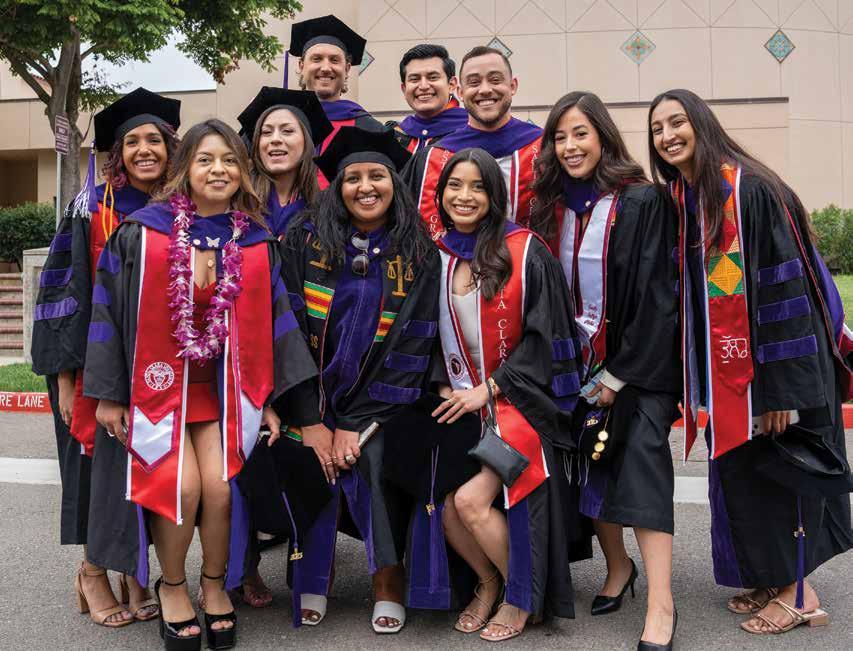A Lifetime of Leadership and Service


A Lifetime of Leadership and Service

ELIZABETH KELLEY GILLOGLY ’93
EditorAMY KREMER GOMERSALL ’88
Art in Motion Art Director, Designer
CHRIS DANIEL Webmaster
SAMANTHA PRASAD
Copy EditorCONTRIBUTORS
Alicia K. Gonzales ’09
David L. Sloss

Abdiel Lewis
Sharine Xuan
Santa Clara University School of Law, one of the nation’s most diverse law schools, is dedicated to educating lawyers who lead with a commitment to excellence, ethics, and social justice. Santa Clara Law offers students an academically rigorous program that includes certificates in high tech law, international law, public interest and social justice law, and privacy law, as well as numerous graduate and joint degree options, including a hybrid parttime program. Located in the heart of Silicon Valley, Santa Clara Law is nationally distinguished for its faculty engagement, preparation for practice, and top-ranked programs in intellectual property. For more information, visit law.scu.edu.
If you have any questions or comments, please contact the Law External Relations Office by phone at 408-551-1748; email lawmedia@scu.edu or visit law.scu.edu/alumni. Or write to Law External Relations, Santa Clara University, 500 El Camino Real, Santa Clara, CA 95053.
The diverse opinions expressed in DISCERN magazine do not necessarily represent the views of the editor or the official policy of Santa Clara University. Copyright 2023 by Santa Clara University. Reproduction in whole or in part without permission is prohibited.
Welcome to our latest issue of DISCERN, Santa Clara University School of Law’s signature publication highlighting the many distinctive strengths of this transformative learning community. Here we share stories about the work of our amazing students, the powerful research and teaching of our renowned faculty, the dedication of our incredible staff, the generous leadership of our donors, and the important contributions to the legal profession made by our loyal alumni. In this issue, we highlight the extraordinary leadership of one of Santa Clara Law’s most distinguished alumni, the Honorable Edward A. Panelli ’53, J.D. ’55 Justice Panelli’s celebrated legal career includes serving as Associate Justice of the Supreme Court of California beginning in 1985 until his retirement from the bench in 1994. His ongoing service to Santa Clara Law is legendary: Justice Panelli served on the University’s Board of Trustees for 59 years and was its chair for 19 years. He is also an ardent Law School advocate who works to raise money for student scholarships, and he serves as Jurist-inResidence, holding court on a daily basis in Charney Hall, where he shares his wise counsel with adoring students twice-weekly. We owe Justice Panelli our deepest gratitude for his decades of dedication to the legal profession and to our Law School.
We are also proud to share an update on the work of the Workers’ Rights Clinic at Santa Clara Law’s Katharine and George Alexander Community Law Center (KGACLC), which for three decades has empowered students to provide essential legal services to the local community while learning the practice of law. Over the past 30 years, with the insightful mentoring and guidance of KGACLC staff and legal professionals, our law students have volunteered more than 110,000 hours in the Workers’ Rights Clinic, resulting in more than $4 million dollars in claim awards. I am grateful to the dedicated KGACLC staff, volunteers, and numerous law students who work to serve these individuals in need.
Santa Clara Law is excited to introduce you to several new faculty and staff-educators who have joined us in recent months. I know you will join me in warmly welcoming them and thanking them for their enthusiastic dedication to our students and our entire learning community.
We hope these stories will inspire contemplation, deep reflection, dialogue, intellectual nourishment, and pride in our Santa Clara Law School community. We welcome your ideas for future issues and we invite your feedback on our content.
Sincerely,
 MICHAEL J. KAUFMAN Dean & Professor of Law
MICHAEL J. KAUFMAN Dean & Professor of Law

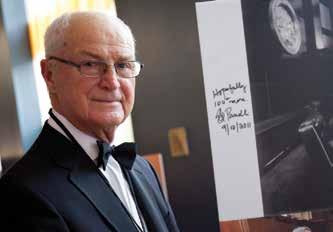 BY ANNIE WARR ’99, MBA ’03
BY ANNIE WARR ’99, MBA ’03
On February 16, the Santa Clara Law community gathered for the 17th annual Diversity and Inclusion Celebration, which recognizes the importance of diversity and inclusion in the legal profession and directly supports the Thurgood Marshall Civil Rights scholarship for students. Santa Clara Law is one of the nation’s most diverse law schools, and this event receives substantial support from law firms and organizations across the country.
“Our diversity is, and always will be, one of our greatest distinctive strengths,” said Dean Michael Kaufman. “Our commitment to an inclusive learning environment is comprehensive—reflected in the strong moral leadership, by our diverse and engaged faculty members, supportive student services, vibrant student organizations, and our network of alumni and friends,” he said. “At this event, we lift up exemplars of moral beauty, people and organizations who have selflessly promoted diversity, equity, and inclusion in our law schools, our profession, and our communities.”
This year, Akshay Verma J.D. ’06 received the Social Justice and Human Rights Award, and the Organization of the Year Award went to Legal Education Access Pipeline, Inc. (LEAP).

During his remarks, Verma stressed the importance of intention in diversity, equity, and inclusion (DEI) efforts. “Sometimes the work feels endless; sometimes the progress seems stagnant; and at times it even feels like we go backwards,” he said. “But recognition like this means the world, and it keeps the fire burning.”
Over the past 20 years, Verma has dedicated his professional career to raising awareness of and championing diversity and inclusion issues. Reflecting on his work at Meta, he remarked that what was most meaningful was the time he spent talking through things like goals, metrics, levers, and recognition—areas where there was not going to be a significant impact without intention.
Cindy Lopez, LEAP’s founder and director, accepted the Organization of the Year Award. A recently retired California Deputy Attorney General and Loyola Law School alumna, Lopez founded LEAP after personally observing an acute need to build access to law school education for groups that are underrepresented in the legal profession in Southern California. Lopez drew on her wealth of leadership experience in the legal arena and in the nonprofit college access field to develop and
expand the LEAP programs. Santa Clara Law is the Northern California LEAP partner.
Sr. Assistant Dean Nicole Maxwell recognized the many Santa Clara law student organizations (LSOs), which she called “a direct reflection of the cultures of the student body and the strengths we celebrate.” Representatives from a number of Santa Clara Law’s LSOs were in attendance: Asian Pacific American Law Student Association, Vietnamese American Law Students, Equality Santa Clara, Women & Law, Middle East North African Law Student Association, Filipino American Law Society, and Latinx Law Student Association.
Deborah Marson, executive vice president, general counsel, and secretary at Iron Mountain—the event’s title sponsor— addressed the attendees in a pre-recorded video message. “Organizations across the globe are acknowledging the pressing need to give unwavering attention to a problem that’s lingered far too long: systemic racism,” she said. She also reminded Santa Clara Law students that they will “have the chance to facilitate action, endorse change, and break down silos to help organizations reach their potential in creating a more diverse, inclusive, and equitable workplace.”
Santa Clara University School of Law received recognition in National Jurists’ PreLaw Magazine for its diversity as well as the breadth of the curricular offerings in international law and high tech law.
Santa Clara Law continues to be one of the nation’s most diverse law schools, earning the No. 20 spot on PreLaw Magazine’s 2022 Best Schools for Diversity list.
As part of its annual issue ranking schools that excel in diversity, international law, innovation, and more, PreLaw Magazine evaluated all ABA-accredited law schools based on how well each school matched with the U.S. average for the respective minority population: Black or African American, Hispanic, Asian (including Native Hawaiian), and Native American faculty and students.
“We are so proud that Santa Clara Law continues to be one of the most diverse law schools in the nation,” said Dean Michael Kaufman. “One of our greatest distinctive strengths, diversity is vital to graduating lawyers who understand, represent, and seek justice for those most marginalized in our world.”
Fifty-seven percent of Santa Clara Law’s current student body identifies as persons of color, and 22 percent are firstgeneration. “As a community committed to racial justice, Santa Clara Law recognizes both the great strides it has made in diversity, as well as the continuing work that will be required to attain the diverse and inclusive campus to which the law school aspires,” said Kaufman. Santa Clara Law has a commitment to training lawyers who represent the growing diversity of California and the country.
PreLaw Magazine also awarded Santa Clara Law an A+ for both its International Law Program and its Tech Edge J.D. Program, based on the breadth of its curricular offerings.
The Law School was among 15 schools in the U.S. that received an A+ grade for being a leader in international law and helping students be better
equipped in matters of global economics, business law, and human rights law— among other areas of law that are heavily influenced by international law. The international law curriculum at Santa Clara includes a broad offering of courses, access to the most extensive and one of the oldest law summer abroad programs of any law school in the country, and access to a number of international speakers and scholars throughout the year.
Additionally, the school’s Center for Global Law and Policy offers opportunities for students and faculty to advance international and comparative law scholarship and education at Santa Clara University.

The Law School was also among 12 schools in the U.S. that earned an A+ grade for its respected high tech law program—including the Tech Edge J.D.— which has trained attorneys who are leading law firms and technology companies in Silicon Valley and around the world. Santa Clara Law is known for leadership and academic scholarship, to increase diversity and inclusion in innovation and inventorship.
“Our signature programs in tech law and international law are among our greatest distinctive strengths, preparing our students for rewarding careers in two of the most growing and impactful practice areas,” said Kaufman. “We are gratified that National Jurist’s PreLaw Magazine has recognized the strength and quality of these leading programs by honoring them with its highest A+ ranking.”
The School of Law has hired its first-ever senior director for diversity, equity, and inclusion, Thiadora (Dori) Pina, who currently serves as a clinical professor and director of the Law School’s externship program. “The position was created to lead Santa Clara Law, as we work within the parameters of the law, to strengthen the enrollment, retention, and success of all students and faculty,” said Dean Michael Kaufman. To continue to build on our diversity as a key distinctive strength, the law school will:
• Increase the enrollment, retention, and graduation rates of students from underrepresented communities.
• Recruit, retain, and promote outstanding educators with diverse and enriching teaching, research, and life experience.
• Implement intentional anti-racism and anti-oppression initiatives in curricular, pedagogy, counseling, career, and barpassage programming.
• Implement restorative justice and trauma-informed practices.
“I look forward to partnering with Dori in her new role to ensure that we are always working intentionally and comprehensively together to become a more diverse, equitable, and inclusive community,” said Dean Michael Kaufman.
“One of our greatest distinctive strengths, diversity is vital to graduating lawyers who understand, represent, and seek justice for those most marginalized in our world.”
—MICHAEL J. KAUFMAN
Dean, Santa Clara LawJIM GENSHEIMER Thiadora (Dori) Pina
On April 12, Santa Clara University School of Law celebrated its 10th annual Day of Giving, a one-day University-wide occasion for alumni and friends to give back to those parts of the Santa Clara University community with which they have the deepest connections, as well as to those programs they feel are making the greatest impact. This year, donors, alumni, friends, and staff generously supported 22 student-centered funds, raising more than $330,000 from 372 gifts—the highest number of gifts ever given on this special day.
The theme of this year’s event—“Tip the Scales”—emphasized the importance of support for student scholarships, experiential learning opportunities, and initiatives that empower law students to meet the demands of a rapidly changing world.
“We are so grateful to our Santa Clara Law community for the inspiring generosity shown at this year’s event,” said Dean Michael Kaufman. “The Day of Giving offers an opportunity to showcase the incredible work of our faculty and
staff in our classrooms, centers, clinics, and communities. It also allows us to highlight powerful student stories, many of which include expressions of gratitude such as: ‘I would not have been able to attend Santa Clara Law without this scholarship.’”
Alexander Community Law Center, Intellectual Property and High Tech programs, law student organizations, the Law Alumni Scholarship, the Lisa A. Kloppenberg & Mark R. Zunich Endowed Law Scholarship Fund, and the Dean’s Merit Scholarship. In addition, generous donations from the members of the Law Advisory Board helped create two new endowed scholarships, demonstrating the inspirational potential of leadership giving.
—MICHAELThe Law School community celebrated the spring day with an ice cream social on Panetta Plaza as well as art fun by a caricature artist. Lead donors kept the excitement going throughout the 24-hour event by making a number of matching gifts to key areas, including the Amicus Fund, the Katharine and George
In December 2022, the U.S. Senate confirmed Santa Clara Law Professor Catherine Sandoval as a member of the U.S. Chemical Safety and Hazard Investigation Board (CSB). A member of the Santa Clara Law faculty since 2004, Sandoval is a widely respected expert in energy, telecommunications, antitrust, and contract law. President Biden nominated her to this esteemed position.
The CSB investigates industrial chemical accidents and is charged with issuing safety recommendations to plants, standard-setting organizations, or regulatory agencies such as the Environmental Protection Agency (EPA) and the Occupational Safety and Health Administration (OSHA). “I am deeply honored by the U.S. Senate’s confirmation of my nomination by President Biden to serve as a CSB member,” said Sandoval. “The CSB’s work is critical to the safety of America’s workers, our communities, our environment, and the economy.”
Sandoval has previously served as a commissioner on the California Public Utilities Commission which regulates energy, water, rail services, and telecommunications for the state. In the Spring 2022 issue of this magazine, she wrote an op-ed arguing that PG&E’s board, executives, employees, and
“These many generous contributions will help to make it possible for us to reach our shared goal of ensuring that every one of our admitted students will be able to enroll and successfully graduate from Santa Clara University School of Law, regardless of their financial circumstances,” said Dean Kaufman. “Together, we are making our extraordinary Santa Clara legal education more affordable and accessible to students from all walks of life.”
To learn more about supporting students and programs at Santa Clara Law, contact Jolee David, assistant dean of advancement, (408) 554 5496, jmdavid@scu.edu.
contractors should be required to undergo training to prevent “criminal thought patterns.” The work, which included research by Santa Clara Law students, referred to consistent patterns of distorted thinking that foster dangerous conduct.
She also served as director of Santa Clara Law’s Insurance Law Institute, where she represented pro bono ratepayers in PG&E’s federal criminal probation proceeding.
“I am beyond pleased that the Chemical Safety Board now has a new chair to conduct its business,” said Senator Tom Carper, chairman of the Senate Committee on Environment and Public Works, who added that Sandoval’s confirmation comes “at a time when the CSB desperately needs leadership that can help the agency deliver on its important mission for the American people.”
Sandoval was sworn in on February 2, 2023 and immediately began her five-year term on the CSB. She has taken a leave of absence from Santa Clara Law to fulfill her term.
“I appreciate Santa Clara University’s support for my research into safety practices and SCU’s support for and commitment to community service,” Sandoval said.
“Together, we are making our extraordinary Santa Clara legal education more affordable and accessible to students from all walks of life.”
J. KAUFMAN Dean, Santa Clara Law
On December 5, surrounded by holiday decor in Mission Santa Clara, Santa Clara Law and the Santa Clara Bar Association hosted a swearing-in ceremony for the newest members of the California Bar.

In his welcome, Dean Michael Kaufman invited those gathered to reflect. “Your loving relationships have nourished you, kept you afloat, sustained you, and inspired you,” he said. “They have helped you to embrace the challenges of a global pandemic, an awakening to racial injustice, and stark reminders of the fragility of the rule of law and our democracy.”
“Scripture compels us: Justice, justice you shall pursue!,” added Kaufman. “It is not enough to learn about justice, or even be a lawyer admitted to the Bar. We must all pursue justice. Justice is not a noun; it is a verb. It is not a status; it’s a calling. It requires action. It demands small acts of loving kindness, which
“Justice is not a noun; it is a verb. It is not a status; it’s a calling. It requires action. It demands small acts of loving kindness, which are the foundation for greater acts to make our world more just, humane, and sustainable, to care for our common home and our common good.”
—MICHAEL J. KAUFMAN Dean, Santa ClaraLaw
are the foundation for greater acts to make our world more just, humane, and sustainable, and to care for our common home and our common good.”
BY THE NUMBERS A+
57% Identify as a member of a minority community
53% Identify as Women
Intellectual Property Law grade from PreLaw Magazine


A
Law grade by PreLaw magazine, Fall 2022
2023 ranking for Part-time J.D. program in Northern California by U.S. News & World Report (#19 in the nation)
On March 3, Santa Clara Law students, staff-educators, faculty, and alumni gathered for the annual Benefit for Justice Celebration and Auction, an event hosted by the Center for Social Justice and Public Service (CSJPS) that lifts up the social justice work being done at the Law School and raises funds for the Center’s vital summer stipend program. The 2023 event sponsors and partners included the Jachimowicz Law Group and Hoge Fenton.
Each year, the CSJPS provides summer stipends to Santa Clara Law students working in nonprofit organizations and government agencies that cannot afford to pay them. For many students, this type of work is their life’s dream, and these grants make it financially possible.
The Honorable Shelyna Brown J.D. ’96, the keynote speaker, served for more than a decade as a revered judge on the Superior Court of Santa Clara County and has won numerous public service awards. “Judge Brown eloquently expressed the overriding importance of public interest work and advised the students to stay true to their fundamental values and their unique purpose,” said Santa Clara Law Dean Michael Kaufman. In addition, three Santa Clara Law students—Kyle Calzia, Isabel Harris, and Jason Cowan— spoke at the event about their summer public interest work, expressing their gratitude for the service opportunities made possible by the grants.
“There is a wide justice gap in California and throughout the country,” said Dean Kaufman, and “Santa Clara Law’s steadfast dedication to social justice and public interest is needed now more than ever.” Eighty-five percent of the people who encounter serious legal problems in areas of
basic human need like health, housing, or employment reported that they received no adequate legal representation. At the same time, although about 25 percent of law students begin their legal education seeking to practice public interest law, only 13 percent of those students graduate from law school still aspiring to do so, explained Dean Kaufman. This public interest career “drift” is caused primarily by the lack of financial support for public interest jobs, which in turn means that most of the people who need legal services do not receive them.
Led by Faculty Director Vangie Abriel and Director Caitlin Jachimowicz J.D. ’10, the CSJPS provides a pathway of practice, education, counseling, advocacy, and resources for students who are called to pursue a rewarding career in public service law.

On March 16, the Northern California Innocence Project (NCIP) at Santa Clara Law celebrated a major victory: client Darwin Crabtree was granted compensation by the California Victim Compensation Board (CalVCB) for the nearly 10 years he spent in prison for a crime he didn’t commit. This has been a multi-decade odyssey for Crabtree and his family—he was convicted in 1991 and released in 2001, though it wasn’t until 2017 that those convicted in California no longer in custody could challenge their convictions. This change, which came about through an NCIP-supported law, allowed the court to vacate Crabtree’s conviction in 2018. During the March 16 CalVCB board meeting, Crabtree said
that, after a long and arduous process: “this represents the end—and I am thankful for that.”
NCIP Supervising Attorney Paige Kaneb addressed the CalVCB board members and those in attendance and remarked how Crabtree endured this process with “incredible grace” until the law was finally changed. “Everything pointed to his innocence and we had just one problem—he had already served his time ... he had served his parole. When he came to us with all of this evidence, the law required that you have to have standing to challenge your wrongful conviction by being in custody still. We had to ask him to do the impossible, and that was to keep waiting.” Kaneb added that while
nothing will ever change what Crabtree endured, “we do at least get to compensate him for his time erroneously served.”
Deputy Attorney General Jessica Leal said that the Attorney General had no objections to granting compensation and that Leal was “personally glad to see this day come for Mr. Crabtree.” The CalVCB board members unanimously approved the motion for compensation.
Crabtree is the fifth NCIP client that has received compensation from the state of California in the last 12 months. These recent grants of compensation are based on a California law that was recently amended thanks to work by the NCIP and the California Innocence Coalition to make compensation statutes fairer.
On March 21, Santa Clara University School of Law faculty, staff, students, alumni, and friends gathered in the Adobe Lodge at SCU to celebrate and honor the 2023 Alexander Law Prize winner, Tara Berta, supervising attorney at the Cooperative Restraining Order Clinic (CROC) in San Francisco.

First awarded in 2008, the Katharine & George Alexander Law Prize was created through the generosity of the late Katharine and George Alexander to bring recognition to legal advocates who have used their careers to help alleviate injustice and inequity.
Katharine Alexander practiced law for 25 years as a public defender for Santa Clara County and taught law courses at San Jose State University. George Alexander served as a professor at Santa Clara Law for 34 years and as dean for 15 years. Both Katharine and George dedicated their lives to instilling a commitment to justice in students and lawyers.
Chip, the son of George and Katharine Alexander, attended the event with his wife, Laurie, while the Alexanders’ daughter, Suzi, attended via live stream.
Since 1999, Tara Berta has served as supervising attorney at CROC in San Francisco, where she leads a team that provides direct legal services to survivors of domestic violence, sexual assault, and stalking. CROC empowers survivors to understand their legal rights and options, and the staff provides free legal services to help enforce and protect those rights, with a particular focus on restraining orders, family law, Title IX, and Marsy’s Rights. Each year, CROC assists 750 to 1000 survivors with securing their personal safety, their children’s personal safety, and financial support.
Beyond her work at CROC, Berta has served the community and helped shape domestic violence policy in numerous ways. Highlights include Berta’s service on the board of directors of Bay Area Women Against Rape from 1999 to 2018. She also co-chaired San Francisco’s Domestic Violence Death Review Team from 2000 to 2015, reviewing domestic
violence-related homicides, strengthening system policies and procedures, and identifying prevention strategies to reduce future incidents of domestic violencerelated injuries and deaths.
Jerel McCrary, former managing director of Bay Area Legal Aid and longtime social justice advocate, introduced Berta, saying “[Tara] has always recognized the need to address systemic impediments that compromise the safety of survivors of violence.” Jerel shared powerful quotes from CROC clients, which he said best illustrated the five characteristics that make Berta the “exceptional lawyer and advocate that she is.” He highlighted Berta’s “limitless compassion for people of all backgrounds,” her “tireless dedication to her clients,” her “unambiguousness,” her “belief in client empowerment,” and her “humility.”
In her remarks, Berta outlined her long history with CROC, which began when she joined as a volunteer, and she also emphasized the powerful practice of deeply listening to the clients who come for help. “We don’t measure our success at CROC by how many restraining orders we get,” she said. “We measure our success based on whether the survivors
we work with feel like we listened to them.” Berta also thanked her entire CROC team, which was in attendance; her parents, who also attended; and the entire Alexander family. “The work done by Katharine and George Alexander during their lifetimes to promote justice in an unjust world is a model for all of us for how and why to serve our communities,” said Berta.
At the end of the evening, Dean Michael Kaufman presented Berta with the award, thanked the Alexander family, and honored the legacy of Katharine and George Alexander. “It is because of their generosity, their vision, their leadership, and their sense of humanity and justice that we are able to gather today and celebrate and lift up Tara’s incredible work and achievements,” he said.
“Tara, thank you for your work and for your example,” Kaufman said. “I think we are all incredibly struck by the fact that you not only have a brilliant mind, but—much more importantly, at this Jesuit Law School—you’ve got a beautiful heart. Thank you for helping us answer our call to do justice and do right by the world.”
“I love to talk with students,” says Honorable Edward A. Panelli ’53, J.D. ’55, one of Santa Clara Law’s most distinguished alumni. Since 2019, he has served as Jurist-inResidence, a program Santa Clara Law launched to connect students with legal experts who share their mastery of a multitude of subjects, from mediation to patents.
“In my meetings with students, we have talked about law school and its challenges, interesting cases, course issues, legal careers, and the justice system, as well as whatever else the students wish to talk about,” he says. “The students say they have found these discussions to be worthwhile and helpful.”
This Jurist-in-Residence program is just one of the numerous ways that Justice Panelli has served the Santa Clara University community and the legal profession over the course of his historic career that spans more than six decades.
After earning his law degree in 1955, Panelli co-founded Pasquinelli and Panelli in Santa Clara, where he practiced for 17 years. In 1963, he was a founding board member of his local community college district in Saratoga, Calif., and he helped to found West Valley College, a public community college there. He served on the school’s board for nine years.
In 1972, Governor Ronald Reagan appointed Panelli to the Superior Court of Santa Clara County, where he served until 1983, when he was named Associate Justice of the First Court of Appeal (1983-84). He was later promoted to Presiding Justice of the Sixth District Court of Appeal (1984-85). In 1985, George Deukmejian appointed Justice Panelli as Associate Justice of the
Supreme Court of California, where he served until his retirement from the bench in 1994. During this time, he authored many notable opinions, including Montrose Chemical Corp. v. Superior Court, Horace Mann Insurance v. Barbara B., and Johnson v. Calvert.
As a judge, Justice Panelli handled hundreds of settlement conferences and mediations involving all areas of the law. During his twenty-two years on the bench, he was recognized as one of the best settlement judges in California.
From 1994-2001, Justice Panelli served as a panelist with JAMS (Judicial Arbitration and Mediation Services), where he was a highly sought after mediator, settling many complex matters.
At Santa Clara University, Justice Panelli has served on the University’s Board of Trustees for 59 years and was its chair for 19 years. He is an ardent advocate for the Law School and works to raise money for student scholarships, including his work on the Justice Panelli Golf Tournament fundraiser, a key stewardship event for 16 years. He has received much recognition and numerous awards over the course of his career (see page 13).
“Justice Panelli is truly ‘Mr. Santa Clara Law’—a brilliant first-generation student who became the first Italian American to serve on the California Supreme Court,” says Lisa A. Kloppenberg, law professor, special assistant to the vice president for University Relations, and former acting president, provost and vice president for academic affairs, and dean of the School of Law. “He and his beloved wife devoted extensive time, wisdom,
The Honorable Edward A. Panelli ’53, J.D. ’55







and resources to Santa Clara University and its Law School. He has been a tremendous advocate and ambassador for Santa Clara Law,” she says. “Personally, I have benefited from his guidance and support since I first joined the Bronco family.”
“My Santa Clara roots literally go back to the beginning,” says Panelli, who was born November 23, 1931. “I was born at home in a house that is now part of the Multicultural Center across from the bookstore,” he says, adding that the site (on a wall outside of the Shappell Lounge) is marked with a plaque indicating that the hundredth justice of the California Supreme Court was born on the site. When he was an infant, his family moved back to Italy for a few years, and when he returned to Santa Clara as a young boy, he spoke no English.
Panelli says he got his first job at age 6 in a dried-fruit yard near his home, spreading apricots to dry, filling boxes with apricot pots, and doing other odd jobs. He later sold magazines and newspapers, shined shoes, and worked in other fruit packing plants and vegetable farms.
“One of my classmates, George Strong J.D. ’55, later taught at the Law School for many years,” he recalls. “He was really beloved by the law students.” Strong went on to serve as Santa Clara Law professor from 1955-60, and as assistant, associate, and acting dean from 1960 until his death in 1995.
“I think I lived the American dream,” says Justice Panelli. “From a first-generation, non-English speaking student as I began my life, to end up on the California Supreme Court is something that would only happen in this country. If we had remained in Italy, I am sure that none of the opportunities afforded to me here would have been afforded to me there.”
In conversations, Justice Panelli frequently expresses deep gratitude to the Santa Clara University community. “My folks had come from being uneducated and unskilled. They always stressed that education was the key to get ahead,” he says. “Santa Clara gave me the opportunity to be educated with a scholarship. I think it is important to repay the institution for the help that they gave me.”
In 2001, thanks to a generous founding gift from Justice Panelli, Santa Clara Law established the Justice Edward A. Panelli Endowed Law Scholarship, an annual award given to a student in good academic standing that has demonstrated financial need.
Throughout the Santa Clara University community— from deans to professors to colleagues to other respected members of the legal community—there is universal respect for Justice Panelli and deep gratitude for his decades of service and dedication.
After graduating from Santa Clara High School, where he was president of his class all four years, Panelli earned his undergraduate degree at SCU. He paints a picture of a quaint downtown Santa Clara with a couple of creameries, where he says lots of college students would congregate for sundaes or a milkshake. He says Santa Clara Law was his choice for law school because it was close to home, he had gone to undergrad at SCU, and because his first cousin, Louis Pasternelli J.D. ’35, was a graduate of the law school.
“My law school class was really small,” says Panelli. “We started out with 35 and ended up with 10—some quit and some didn’t make the grade,” he recalls. “Collegiality was a skill I learned with my fellow classmates. We were such a small group—everybody tried to help each other.”
Clockwise: Justice Panelli and son at his first swearing-in as a Superior Court Judge, March 17, 1972, Santa Clara County Superior Court Auditorium; the original Panelli Moot Court room on its dedication, November 6, 1989; Panelli speaks at Santa Clara Law commencement; Before the 1995 Law Commencement, then-U.S. Attorney General Janet Reno (commencement speaker), center, shares a laugh with SCU President Paul Locatelli, S.J., Associate Dean Mary Emery J.D. ’63, Dean Mack Player, and Honorable Edward A. Panelli ’53, J.D. ’55.
“I was a new attorney when I met Justice Panelli,” recalls Judge Risë Pichon ’73, J.D. ’76, the first minority Presiding Judge in Santa Clara County and a member of SCU’s Board of Regents. “He was a Superior Court Judge at the time, and I had been assigned cases in his courtroom. Before that, I only knew of him by reputation as a highly respected judge known for his keen intellect, knowledge of the law, and extraordinary courtroom management skills. He presented as described by others—confident and self-assured, gracious and kind, and inclusive of all. He was and remains highly respected as a legal scholar, dedicated to service,” she says. “He has had a remarkable career, and his rapid rise, from Superior Court Judge to Supreme Court Justice, came as no surprise to those who knew him. Justice Panelli has remained committed to his alma mater, and has used his leadership skills for its advancement as a University. He is also devoted to the success of Santa Clara University students, gives generously of his time to mentor law students, and enjoys doing so,” she adds.
“Justice Panelli’s distinguished judicial career was characterized by his high degree of integrity and commitment to justice,” says Larry Sonsini, chairman of the SCU Board of Trustees and CEO and chairman of Wilson Sonsini Goodrich & Rosati for more than 35 years. “He has always been pragmatic, thoughtful, thorough, and balanced with excellent perspective. He is a man from humble beginnings who never deviated from his dedication to hard work, intellectual pursuit, and spiritual faith. After serving 22 years on the bench, he continued to contribute to justice
“I think I lived the American dream,” says Justice Panelli. “From a firstgeneration, non-English speaking student as I began my life, to end up on the California Supreme Court is something that would only happen in this country.”





as a mediator, overseeing more than 3,000 mediations,” added Sonsini. “Justice Panelli’s dedication to Santa Clara University is truly legendary. Early in his career, he became general counsel to the Board of Trustees, who at the time were all Jesuits. He has served on the Board for almost 60 years and as Chair of the Board for 19 years. In addition, he has contributed to the University in so many compelling ways as a teacher, mentor, advisor, and philanthropist. His contributions to Santa Clara and society in general are remarkable and everlasting.”
“While it is impossible to identify the numerous ways that Justice Panelli has impacted our students, our Law School, and our legal community, we know that he has inspired excellence in our students and demonstrated the highest ethical standards for practice,” says Ellen Kreitzberg, professor emeritus at Santa Clara Law. “Over the decades, Justice Panelli has served as a mentor to

Over the many decades of his distinguished career, Justice Edward A. Panelli has received much recognition and numerous awards, including:
Honorary Doctor of Laws, Santa Clara University School of Law, 1981
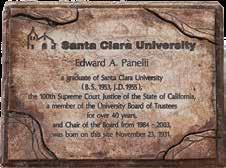
Owens Lawyer of the Year, Santa Clara University School of Law, 1982
Dedication of the Justice Edward A. Panelli Moot Court Room, Santa Clara University School of Law, 1989
Paul L. Locatelli, S.J., Award for distinguished and outstanding service to the Alumni Association of Santa Clara University, awarded to Justice Panelli and his wife, Lorna, 2011.
many and has been generous with both his time and his insights. He has shown our students the importance of preparation, excellence, and civility in all areas of legal practice. These are the qualities that will serve our students well throughout their professional careers.”
“Justice Ed Panelli is a consummate Santa Clara Law lawyer—thoughtful, steeped in law, and a very practical problem-solver,” says Donald J. Polden, dean emeritus and professor of law at SCU since 2003. “His career as a lawyer, trial judge, and justice on the California Supreme Court showcase an exemplary life and one that we hope our students will study and emulate,” he says. “Moreover, his love for Santa Clara and its law school provides a model for other graduates and friends of the University and Law School.”
“Justice Panelli has devoted his entire professional career to public service. We are all so grateful to him for his devotion to our law students and our entire law school community,” says Michael J. Kaufman, dean and professor of law at SCU. “He mentors, counsels, supports, cheers up, and lifts up countless law students virtually every day in Charney Hall through his sage advice, caring presence, loving kindness, inspiring stories, remarkable life’s journey, and his example of what it truly means to live out our Jesuit mission of service for and with others. Through the work of his keen intellect and capacious heart, Justice Panelli is a magnificent expression of God’s love.”
Clockwise: Justice Panelli at the Santa Clara Law Centennial Celebration, 2011; Justice Panelli honored for 59 years of service to the Board of Trustees; Justice Panelli and Ruth Bader Ginsberg; Justice Panelli and his wife Lorna, who received an honorary degree from Santa Clara Law at the 2018 Commencement.
Lifetime Achievement Award, JAMS, the largest private provider of mediation and arbitration services worldwide, 2014
Dedication of Santa Clara Law’s new, stateof-the-art campus building, Charney Hall of Law, which includes the new Justice Edward A. Panelli Moot Court Room, 2018. In addition, the Wellness room, located on the third floor of Charney Hall, was named in honor of Panelli’s late wife, Lorna (1934-2019), who was a 2018 recipient of an honorary Doctor of Public Service from Santa Clara University. A private and versatile space, the Wellness Room is available for nursing moms and also serves as a place for quiet reflection, to meditate, reflect, or de-stress.
“Justice Panelli has devoted his entire professional career to public service. We are all so grateful to him for his devotion to our law students and our entire Law School community.”
—MICHAEL J. KAUFMAN Dean, Santa Clara LawPlaque located outside the Shapell Lounge commemorating the place where Justice Panelli was born.
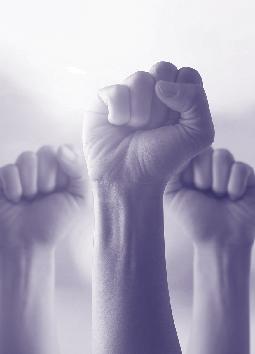


For nearly three decades, the Workers’ Rights Clinic at the Katharine and George Alexander Community Law Center has empowered students to provide essential legal services while learning the law.


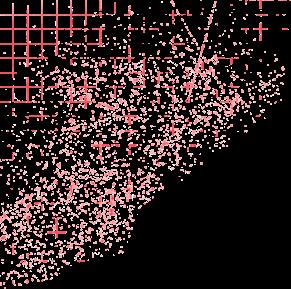


 BY ELIZABETH KELLEY GILLOGLY ’93
BY ELIZABETH KELLEY GILLOGLY ’93
“Martha”* was employed as a server and bartender at a restaurant. She came to the Katharine and George Alexander Community Law Center (KGACLC) at Santa Clara Law for help because she was not receiving all her wages, overtime pay, or meal and rest breaks. After conducting an extensive interview to gather the details under the supervision of a Law Center attorney, a Santa Clara Law student drafted a letter to the restaurant owner requesting Martha’s payroll, timekeeping, and personnel records. This letter also notified the restaurant owner that Martha intended to file a claim for unpaid wages, overtime pay, and violations of her meal and rest break requirements. The next day, the restaurant owner terminated Martha. Then, with the help of the KGACLC, Martha filed a wage claim and a retaliation claim with the Labor Commission.
The Labor Commission then issued an Order, Decision, or Award (ODA) in Martha’s favor. When the restaurant owner did not pay Martha, the Labor Commission recorded a judgment in Santa Clara County Superior Court. The Labor Commission also determined that the restaurant owner retaliated against Martha in violation of the relevant Labor Code provisions and awarded Martha back pay and penalties. Again, the restaurant owner failed to pay. By statute, the Labor Commission must file a lawsuit if retaliation determinations are unpaid. The Labor Commission filed suit, and the Law Center signed a common interest agreement with the Labor Commission. The Law Center worked on the case with the Labor Commission attorney and attended the mediation, and the case settled. Martha says she was happy
with the result and thankful that the Law Center assisted her.
Martha is one of more than 1,000 low-income individuals and families reached each year by the KGACLC in three key practice areas: workers’ rights, consumer rights, and immigration rights. Martha’s case was handled in the Workers’ Rights Clinic and illustrates the complexity of cases that the clinic regularly sees.
The Katharine and George Alexander Community Law Center began nearly 30 years ago in 1994, as the East San Jose Community Law Center (ESJCLC), which was housed in a small office on Alum Rock in San Jose. This project was created by La Raza students and law professors at SCU who saw a need to help day laborers collect wages they were due. In 1995, the Center began offering assistance with consumer matters, and in 1997 it expanded to help low-income entrepreneurs with their legal needs. In 2004, George Alexander, a former professor and dean of the Santa Clara University School of Law, and his wife, Katharine, made a generous donation to the ESJCLC, and the Center was renamed the Katharine & George Alexander Community Law Center.
Over the past three decades, the Law Center has grown into a robust program that serves more than 1,000 individuals each year through a combination of clinics, direct representation, community outreach programs, and workshops. These extensive pro bono legal services, valued at more than $60M, are made possible
*Note: The story of “Martha” is based on a real story; personally identifying and other information was changed to protect privacy.
through the generosity of many donors as well as the combined work of expert mentor attorneys and Santa Clara Law students who perform real-world legal work and serve others within this mentoring framework.
The Workers’ Rights Practice Area provides free legal services to low-income individuals who have experienced unfair and illegal treatment at their place of employment. The Workers’ Rights Clinic focuses on a wide variety of issues including:
• Unemployment issues
• Wrongful termination
• Unpaid wages (meal and rest break violations, unpaid overtime, unpaid vacation, final paycheck, etc.)
• Harassment and discrimination at the workplace for various reasons (race, color, national origin, gender, sexual orientation, pregnancy, age [over 40], disability, etc.)
• Retaliation from employers
• Help with Family and Medical Leave Act/California Family Rights Act and California Paid Family Leave Act issues
• Assistance with representation at the Labor Commission, the California Civil Rights Department, and the Unemployment Insurance Appeals Board
• Assistance with claims at the CA Department of Labor Standards Enforcement, Department of Fair Employment and Housing (DFEH) now California Civil Rights Department (CRD), Equal Employment Opportunity Commission, and the National Labor Relations Board
Ruth Silver Taube J.D. ’93 is the supervising attorney of the Workers’ Rights practice and an adjunct professor at Santa Clara Law. A passionate and award-winning advocate with many decades of experience in the field, Silver Taube also does extensive community work. She serves as special counsel to Legal Aid at Work, legal services co-chair of the South Bay Coalition to End Human Trafficking, is a delegate to Santa Clara County’s Human Trafficking Commission, and a founding member of the Bay Area Equal Pay Collaborative.
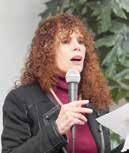
“This SCU clinic is the only program in the county that does workers’ rights, so it fulfills a critical need,” says Silver Taube. In the Workers’ Rights Clinic, a Law School course that Silver Taube teaches each semester and in the summer at Santa Clara Law, she meets with students twice a week. On Tuesdays, in the clinic portion of the class, students conduct client interviews (conducted via phone since 2020 due to Covid). On Thursdays, Silver Taube teaches a 2-hour class in which she covers a wide variety of critical topics, including wages, termina-
tion, discrimination, leave acts, employee benefits, unemployment, immigration rights, privacy, union rights, and more.
“In class, I do a lot of hypotheticals, so it is both practical and theoretical,” says Silver Taube. “I want students to really learn how to look at these employment problems—how to spot the issues, how to effectively interview clients, what agency or agencies can help, what the statute of limitations are, and so on,” she says.
In the clinic portion of the class, Silver Taube and five or six volunteer supervising attorneys pair up and work closely with each student. “Key to our service delivery model are the many volunteer mentor attorneys whose knowledge and expertise helps us supervise
more students and ultimately serve more clients,” says Deborah Moss-West J.D. ’94, executive director, KGACLC. “We owe much gratitude to them.”
After the students interview clients, they meet with their supervising attorney to discuss possible solutions. The students then follow up with the clients, giving them advice and referrals. Students also write memos, which are reviewed by Silver Taube. “Students do a lot of followup work, including conducting research, calling an employer or union, or writing a demand letter,” Silver Taube explains.
“We don’t have the resources to litigate cases, but we do represent a few clients at government agencies,” says Silver Taube. “For the most part, we refer cases that need to be litigated. I often partner with KGACLC’s immigration practice if our clients need that kind of support,” she says.
“It is very meaningful to me to provide this service to low-income immigrant clients, and I also truly love working with students,” says Silver Taube. “The clinic offers such an important experience for students, many of whom have not seen firsthand what exploitation or wage theft looks like, or how sexual harassment plays out and the impact on the clients,” she says. “This work opens the students’ eyes to the plight of low-wage immigrant workers, and it is so empowering for students to be of service,” she adds.
“This work also helps students become better lawyers. Whether you are plaintiff side or a defense attorney, you need to be able to evaluate a case, look at motivation, and truly understand the client and their life experience. This clinic sharpens students’ skills in so many areas,” she says.
In addition, Silver Taube says she is grateful for the energy, passion, curiosity, and skills that the students bring to the table. “We are especially fortunate to have a diverse group of law students who can speak a lot of languages,” says Silver Taube, which enhances the clinic’s ability to serve as many clients as possible.
“This clinic is the highlight of my week,” says Silver Taube. And she is clearly dedicated to and passionate about
“The clinic offers such an important experience for students, many of whom have not seen firsthand what exploitation or wage theft looks like, or how sexual harassment plays out and the impact on the clients.”
—RUTH SILVER TAUBE J.D. ’93Ruth Silver Taube J.D. ’93
the work. “In between semesters, I do all of the client interviewing so we don’t have a gap in advice or service,” she explains. In all of her community work, Silver Taube networks and points people toward the many services offered by the KGACLC. “I make sure to increase the visibility of our program. I want to help everyone,” she says. Through joint clinics and other outreach work, she has made connections to many different immigrant communities.
“Ruth is a tireless ambassador for KGACLC, from her early volunteer days to now teaching the Workers’ Rights Clinic,” says Moss-West. “She goes above and beyond the call of duty.”
One point of pride for Silver Taube is that many of the clinic’s volunteer supervising attorneys are her former law students (see sidebar). “We are fortunate to have such dedicated and capable volunteer attorneys,” explains Silver Taube. “It shows the impact of the program that students come back and that volunteering attorneys come back,” she says.
One such alumni volunteer is Hai Dao J.D. ’14. “I volunteer because the high cost of living in the Bay Area means every paycheck matters to low-income families,” he says. “Jobs keep households in the communities they grew up in and helped to create, and [that] affords the next generation the opportunities their parents sacrificed to provide for them.”
Over the past 30 years, more than 2,000 students have worked in one of the KGACLC clinics, and more than 500 have worked in the Workers’ Rights Clinic. Many students rave about the powerful impact this work has had on their lives.

“The Workers’ Rights Clinic has been the most positive and helpful course I have taken in law school,” says Daphne Wilson J.D. ’23. “The clinic was an incredible opportunity to develop important skills that I will carry into my future practice,” she says. “This experience helped me gain confidence in my ability to be an effective advocate for clients in the future,” she says. “This clinic has solidified my passion for this career.”
Tracie Ehrlich 3L says the class offered her substantial “transferable counseling and advising skills,” and “the kind of practice that is hard to come by in law school.” “Helping disadvantaged clients navigate the legal system has given me real-time education on what it means to counsel and advise as an attorney,” she says. “It has also illustrated for me the critical role that attorneys play in providing people in need with the information and resources that can truly have a positive impact.”
“This class provided the rare opportunity to apply class lessons in a realworld, client scenario,” says Rachael Loriaux J.D. ’23 (expected). “This is an incredibly effective way to learn the material because I had to explain the law to another individual in layman’s terms. This course has also helped me have confidence as a law student to work with clients and interpreters,” she says, adding, “I also learned the value of having a network of resources to provide for clients.”
Abdul-Malik Bdaiwi, a 2L, says that working at the Law Center “gave me the opportunity to do what I came to law school to do: to help people. Meeting with some clients broke my heart and had me holding back tears while attempting to maintain professionalism over the phone, but I was able to help them, and I would not give up that opportunity for anything,” he says.
Charles Lee 4L says he appreciated how everyone took the work very seriously. “[We] all shared the joy and sorrow of the clients,” he says. “The clinic reminded me that I’ve always wanted to be a person who could make some impact on someone else’s life,” he added. For more information or to make a donation to support the Community Law Center, visit law.scu.edu/kgaclc.
Sarah Abraham
Brooke Barranti J.D. ’21
Timothy Broderick
Christine Coughlan J.D. ’21
Hai Dao J.D. ’14
Robert Greeley ’87, J.D. ’97
Sarah Jabin J.D. ’21
Bill Jhaveri-Weeks
Darya Landa J.D. ’15
Drew Lewis
Ming Liu J.D. ’19
Kasia Markham J.D. ’20
Rachel Mino
Felwina Opiso-Mondina J.D. ’16
Joaquin Torres J.D. ’21
Huy Tran J.D. ’12
Kyle Weinheimer J.D. ’16
Nine legal minds are diversifying faculty expertise and student learning at Santa Clara Law
BY ALICIA K. GONZALES ’09Since 2020, seven professors, one senior clinical fellow, and one deputy director have arrived to teach on the Mission campus at Santa Clara Law. They can be found in classrooms and clinics, educating law students as well as publishing influential papers in top law reviews and academic journals. Their research interests range from “spoofing” in stock markets to governance of military activities in outer space, and two have received tenure-stream endowed professorships named in honor of Albert J. Ruffo J.D. ’36—a reflection of their commitment to scholarship, teaching, and service. Two are also Santa Clara Law alumni who have returned to their alma mater to share thier wisdom and experience with law students.
Albert
J.D.,
Sue S. Guan’s teaching and research interests include financial markets, securities regulation, corporate law, and contracts. Her current research focuses on social media and retail trading, stock market information and price discovery, and emerging forms of market manipulation such as spoofing. Prior to arriving on campus, Guan was the postdoctoral research scholar for the Program in the Law and Economics of Capital Markets at Columbia Law School and Columbia Business School after working in private practice at Cleary Gottlieb Steen & Hamilton LLP, where she focused on multiple benchmark-related antitrust class actions. She also represented pro bono a class of detainees at Rikers Island in a Section 1983 lawsuit.
Assistant
J.D.
In fall 2020, Mary Procaccio-Flowers J.D. ’12 joined the Santa Clara Law faculty full-time to teach, among other courses, Legal Research, Analysis, and Writing. Prior to SCU, she worked in private practice at Wilson Sonsini Goodrich & Rosati, representing technology companies in intellectual property litigation before federal, state, and appellate courts, as well as before the International Trade Commission. She also advised companies regarding the impact of intellectual property and intellectual property litigation on a variety of corporate transactions. While in private practice, Procaccio-Flowers represented several clients pro bono, including individuals seeking asylum and conservation organizations in environmental litigation.

Albert J. Ruffo Assistant Professor of Law
J.D., Yale University
Nicholas Serafin works at the intersection of moral and political philosophy and anti-discrimination law and policy. He earned a Ph.D. in philosophy in 2019 from the University of Michigan and was a finalist for the Charlotte W. Newcombe Doctoral Dissertation Fellowship. While completing his J.D., he worked for the International Refugee Assistance Project and the ACLU LGBTQ Rights Project. Serafin’s work is published in the Fall 2020 BYU Law Review and has been featured in Slate. He is currently interested in the foundations of moral equality and the moral basis of anti-discrimination law.
Assistant Professor of Law

J.D., Cornell Law School
Taylor Dalton’s teaching and research interests include international law and courts, international humanitarian law, foreign relations law, and civil procedure. Dalton completed his doctorate at USC’s Political Science and International Relations (POIR) program. His current research examines how international norms, law, and institutions affect both state and nonstate behavior. Specifically, his subject areas of interest include state exit from international institutions; arming and arms control; governance of military activities in outer- and cyberspace; and appellate procedures in international courts and tribunals. Dalton has more than 10 years of experience as a civil litigator in courts throughout California. During his years of practice, he provided immigration and naturalization services pro bono through the Public Law Center in Southern California.

Sean Bland’s work focuses on law and public health. He is interested in legal and social issues that impact the health and well-being of marginalized communities, including racial and ethnic minorities; lesbian, gay, bisexual, transgender, and queer (LGBTQ) people; people who engage in sex work; and people who use drugs. His scholarship draws on his background in public health research and policy work related to the HIV epidemic and the intersecting epidemics of other infectious diseases and substance use disorders. He has authored and co-authored publications in the Journal of the American Medical Association and The Lancet as well as numerous reports and policy briefs. Before joining Santa Clara Law, Bland was a senior associate at the O’Neill Institute for National and Global Health Law. Prior to that, he worked as a litigation associate at Fried, Frank, Harris, Shriver & Jacobson LLP and as a law clerk with the U.S. Senate Committee on Health, Education, Labor, and Pensions; the American Psychological Association; and Lambda Legal, where he held the 2011 Tyron Garner Memorial Fellowship for African American LGBT Civil Rights.
Senior Clinical Fellow and Assistant Director, Tech Edge J.D. J.D. ’00, Santa Clara University School of Law
Linsey Krolik J.D. ’00 is a senior clinical fellow in the Entrepreneurs’ Law Clinic. She is also director of the interdisciplinary Bronco Entrepreneurs Advisory Clinic Hours (BEACH), where she trains volunteer attorneys and students to counsel clients seeking legal advice for startups, as well as an assistant director in the Tech Edge J.D. program. Krolik has been an attorney advising companies of all stages—from startups to global companies—for more than 20 years. She began her career at large companies such as ARM and Palm, working on IP licensing transactions and trademarks. She then started a solo law practice, functioning as an outsourced general counsel for many startups in the Bay Area. In November 2022, Krolik was appointed to the Consulting Group on the Establishment of a Legal Specialization in Privacy Law, which provides recommendations to the California Board of Legal Specialization.

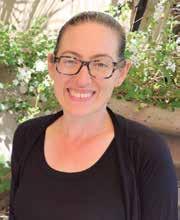


Fiona McKenna teaches Professional Responsibility, Legal Analysis, and Research and Writing at Santa Clara Law. Prior to joining Santa Clara, she taught Appellate Advocacy, Legal Writing and Research, and Professional Responsibility and directed the legal writing program at Golden Gate University School of Law. McKenna is an active member of the legal writing community, currently serving as co-chair of the Association of Legal Writing Directors (ALWD) Biennial Program Committee. She previously served as co-chair of ALWD’s Leadership and Development Committee. She has also presented at several legal writing conferences across the country and served on the editorial board of The Second Draft. Prior to entering academia, McKenna practiced as a litigator, representing clients in business disputes and employment matters. Her pro bono work included representing foster parents in juvenile dependency proceedings. As a first-generation college and law student, McKenna particularly enjoys supporting and mentoring first-generation students.
J.D., Harvard Law School
For more than a decade, Britton Schwartz has focused on and taught international human rights law and environmental justice, with expertise in the Inter-American Human Rights System, Indigenous Peoples’ rights, communitydriven policy reform, and local implementation of human rights norms. She is the deputy director of the International Human Rights Clinic (IHRC) and helped develop the program as an inaugural clinical fellow and supervising attorney for IHRC. Schwartz has also worked extensively on the human right to water and related environmental human rights, beginning with a Berkeley Law Foundation fellowship at the Community Water Center. As co-chair of the U.S. National Coalition on the Human Rights to Water and Sanitation, Schwartz supported dozens of community-based groups to advocate before the InterAmerican Commission on Human Rights, various U.N. special procedures, and U.S. federal government agencies.
J.D., Chicago-Kent College of Law
As a full-time faculty member, Melody L. Sequoia teaches Contracts and Legal Research, Analysis, and Writing to firstyear law students, among other courses. Previously, she taught Advocacy, the third semester of Santa Clara Law’s Legal Analysis, Research, and Writing program, and Advanced Legal Writing: Bar Exam, which focuses on developing the skills necessary for the essay and performance tests of the Bar Exam. Sequoia has also served as a faculty grader for the Honors Moot Court Internal Program and enjoys working with students to build confidence in their research, writing, and oral advocacy skills. She is the founder of the Sequoia Law Firm in Menlo Park, focusing on consumer protection litigation, including unfair and abusive business practices, predatory lending, FDCPA and Rosenthal Act violations, and false advertising. She is licensed in both California and Illinois.
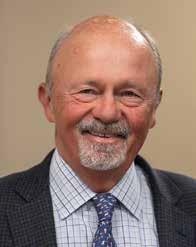 BY ANNIE WARR ’99, MBA ’03
BY ANNIE WARR ’99, MBA ’03
Donald J. Polden, professor at Santa Clara Law, is a respected legal scholar and expert in antitrust, employment law, legal education, and lawyer leadership development. As dean of Santa Clara Law from 2003-13, he was instrumental in developing the curriculum for leadership education at Santa Clara Law and nationally, and this movement continues to grow in American legal education. His latest book, Leading in Law: Leadership Development for Law Students (Carolina Academic, Press 2022), co-authored by Barry Posner, makes the case for a comprehensive approach to leadership education and development in law school education. Designed for law schools and legal educators, the book prepares law students to exercise leadership in law firms and legal organizations and draws upon a leadership development model that is evidence-based, practical, and used extensively in other professional disciplines. Barry Posner is a recognized expert in leadership and the author of many acclaimed books including The Leadership Challenge, and he serves as the Accolti Endowed Professor of Leadership at the Leavey School of Business at Santa Clara University. Discern recently spoke with Polden about the book and lawyer leadership generally.
DISCERN: Why is leadership education so important for law students?
DONALD POLDEN: The bottom line is that law students will be going into leadership positions during their careers. Lawyers have historically held an outsized influence on leadership roles in the United States—for instance, most members of Congress and former Presidents were trained as lawyers. Until we started developing this curriculum, there was no formal leadership training in law schools. Business schools, public policy schools, and even medical schools had been offering leadership training, but law schools were way behind. Think about what leaders do: they articulate a vision for change and persuade others toward this vision. This is also what lawyers do. There is a key set of skills and attributes that lawyers must develop that are also required for leaders. It makes sense to use leadership development as a way to enhance lawyer development.
D: How did you and Barry Posner decide to write this book together?
P: We had been talking about lawyer leadership for quite a while. When I was a new dean in 2003, Barry and I became friends, and he gave me a copy of his book, The Leadership Challenge, co-authored by James M. Kouzes. I was eager to read it because I had been thinking about teaching a leadership class
for lawyers. This idea arose when I asked my father, who was a career Army officer, whether he thought leadership development training was applicable to lawyers. His response was: “I have no idea why not.” Barry was of the same opinion. Fast forward, and I had been teaching my leadership class at Santa Clara for nearly 20 years. One day, I mentioned to Barry that I wanted to put some of those ideas about lawyers as leaders in writing, and he asked: “Would you want to do that together?”
D: When you were writing the book, how important was it to gather insights from current or former students in the industry?
P: I have an excellent cadre of alumni that have taken my leadership class and are demonstrating their leadership skills in their law firms and organizations. For instance, one of the guest speakers for my class was an outstanding graduate who saw an opportunity to be a leader at her large law firm. Though the firm had been spending a lot of money and time onboarding new associates, the new associates still had many questions and uncertainties. As a second-year associate, my former student had relevant experience and good ideas about ways that she could help the new associates get acclimated. She asked the firm’s management if she could share her ideas with the new associates and they agreed. She produced a 70-page manual for new associates, including detailed onboarding information, advice, and requirements. The managing partner thought her manual was fabulous, shared it with the firm’s main management team, and it became a widely used document in many of the firm’s offices. Her initiative in creating the manual helped the firm to shorten the time between new associates being hired and onboarded to generating revenue, and it improved the new associates’ understanding of the firm’s expectations. Her story is a great example of how even young lawyers can demonstrate their leadership skills even if they are not in a leadership position.
D: How else do leadership and lawyering interact?
P: Actually, this is a central focus of the movement in leadership development among lawyers and law firms. Early on, I was influenced by the work of one of Stanford Law School’s most prolific scholars, Deborah Rhode, who was an early advocate for applying leadership development to lawyers. I invited her to speak at some early conferences and workshops on lawyer leadership education that we hosted at Santa Clara Law. Deborah was tremendously influential to many legal educators in thinking about why lawyers and law students need leadership education. Our early work at the Santa Clara Law leadership workshops (which emphasized sharing information about how law schools were developing leadership curricula) was instrumental in identifying and supporting the growing movement in legal education. Educators at other law schools—Tennessee, Baylor, and Ohio State for example—also shared course syllabi, teaching materials, leadership case studies, and methods on teaching leadership to law students. Then, some of these law school leadership educators decided it was time for the Association of American Law Schools (AALS) to add a section on leadership. About five years ago, we guided a petition for a new section for law teachers and administrators interested in advancing leadership education through the AALS process. Now, the AALS Section on Leadership has almost 400 members from about half of all U.S. law schools, and that number is growing. Many law schools are now offering courses and programs on leadership skills development. It is an immensely rewarding and highly collaborative effort by many in legal education.
tion, and transactions—our book offers a systematic framework for developing leadership in law students and lawyers.
D: Are you concerned that emphasizing leadership roles in the legal profession will add to stereotypes of lawyer leaders being mostly white men?
P: Actually, we think quite the opposite: leadership development is an excellent way for minority and women lawyers to prepare for law firm leadership roles. In my leadership class, the first assignment asks students to share their best leadership experience, which is a reminder that everyone can have these leadership experiences (based on their motivation and personal preparation) and that there is personal and professional growth possible through leadership skills development. Santa Clara Law is one of the most diverse law schools in the U.S., and so my law students are from very diverse backgrounds—many share the aspiration to strengthen their leadership abilities because they believe it will help them be better lawyers and citizens.
D: How much of a role do values, ethics, and morals play in law and leadership?
P: Quite a bit, actually. In the book, we devote considerable attention to the legal profession’s ethical norms as a foundation to exceptional leadership in legal work. Professional ethics, like leadership, are about honesty and trustworthiness. Research shows that people generally won’t follow somebody they distrust. Similarly, in law, ethical behavior is a professional norm—lawyers must thoughtfully commit to a career of ethical, responsible lawyering and professional comportment. This commitment to ethics is also an essential part of anyone’s role and responsibility as a leader.
D: How have law students reacted to the book?
D: This movement is still growing exponentially, right?
P: Yes, indeed! In addition to the national emphasis on leadership education in law school, there has also been an increase in books and materials on lawyer leadership. This includes our book, which Barry and I think is unique among the recent offerings because it provides a model for learning and developing leadership abilities through the “five practices of exemplary leadership” (a model that Barry and his co-author, James M. Kouzes, developed for their book of the same title). In their book, The Leadership Challenge, Posner and Kouzes shared the empirical research they conducted on various questions: Why would you willingly follow somebody? What traits about them influence your decision to follow? What attributes do you see in somebody from whom you would take the lead? Their research showed that leaders have key behaviors, skills, and attributes that make others more likely to follow them, including their ability to lead by example, to envision a solution to problems or a crisis, to engage through persuasion, and to influence others to take on problems together. By taking these key skills and applying them to the work that lawyers do—in their firms, government offices, litiga-
P: The students’ reactions to the book have been very positive. All the students in my leadership classes for the past two years have used this book to guide their introduction to lawyer leadership education and to advance their leadership skills. My leadership classes average about 50 students per section—those students have engaged eagerly in the book’s exercises and case studies, and they have written exceptional papers about lawyer leadership. I plan to make some of these student papers available on the Law School’s website for the Institute for Lawyer Leadership Education. We have also heard that some organizations will use the book as a guide for lawyer development in law school clinical programs, which makes perfect sense.
The many adopters of our book believe that leadership education is an excellent way to educate law students for their roles as legal professionals and to prepare them to become ethical, competent, problem-solving lawyers and citizens.
AVAILABLE NOW:
Leading in Law: Leadership Development for Law Students
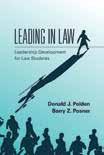 By Donald J. Polden, Barry Z. Posner (Carolina Academic Press, 2022)
By Donald J. Polden, Barry Z. Posner (Carolina Academic Press, 2022)
“Think about what leaders do: they articulate a vision for change and persuade others toward this vision. This is also what lawyers do.”
—DONALD J. POLDEN
As string lights shimmered across Panetta Plaza on a beautiful Friday evening in October, Santa Clara Law welcomed back more than 150 alumni, friends, and family to Charney Hall for the 2022 Law Reunion to share the joy of reuniting on campus.

“Guided by our mission ... in the service of and with others, [we] use our education at this incredible institution to do good and to do well, and to go forth and set the world on fire, and do some healing work that the world desperately needs these days,” said Santa Clara Law Dean Michael Kaufman in his remarks that evening. “We are opening up doors of opportunity for people who wouldn’t otherwise be able to go to law school, and you are helping that endeavor by giving our incoming students great financial resources and support and mentoring opportunities as well. We could not do it without you.”
The Law School’s celebration was part of SCU’s Grand Reunion jubilee, which was especially significant this year as SCU celebrated the inauguration of Doctor Julie Sullivan as the first woman and layperson to become president of Santa Clara University.

With a special theme of “Renewing, Reliving, and Rekindling” this year, the Santa Clara Law event included recognition of class years ending in 2 and 7. The Law School also hosted an induction into the Ruffo Society for 72 alumni who were celebrating 50 years since graduating from Santa Clara Law. New Ruffo Society members in attendance included the Honorable Raymond “Ray” Davilla ’69, J.D. ’72, the Honorable Robert “Skip” Durham
J.D. ’72, Aryeh Korthamar ’67, MBA ’70, J.D. ’72, James “Brian” Madden ’68, J.D. ’72, the Honorable Phil Pennypacker J.D. ’72, William “Bill” Pursley J.D. ’72, G.E. “Ed” Rudloff Jr. J.D. ’72, Steven D. Siner J.D. ’72, Rodney J. Stafford J.D. ’72, Daniel S. Standifer ’69, J.D. ’72, and Alan Zapala ’69, J.D. ’72. “Their bonds with one another are living proof of how Santa Clara Law fosters meaningful communities that last well past graduation,” said Thi Tran J.D. ’21, director of alumni relations and annual giving.
“It’s nights like this that make you remember the unquantified weight of being a law graduate and member of this Bronco circle,” said Tran. “We could not be prouder of our alums and their professional achievements since law school. The state of Santa Clara Law is optimistic. There is truly no better time to be a part of this momentous chapter at Santa Clara University and Santa Clara Law.”
Genie Harrison has been honored as the Consumer Attorney of the Year for her work to win justice for the survivors of Harvey Weinstein’s abuse. The award is given to those who have significantly advanced the rights or safety of California consumers by achieving a noteworthy result in a case.
Hon. Palvir Shoker was appointed judge by Governer Gavin Newsom in the Contra Costa County Superior Court.

Hilary R. Sledge-Sarnor is now a partner at Greenberg Traurig, LLP in their Los Angeles office. “As I transition back into private practice, joining Greenberg Traurig as a finance shareholder, the legal and professional foundation I received at Santa Clara Law will continue to be valuable,” said Sledge-Sarnor.


Hans C. Ruschke was promoted to partner at Bullard, Brown & Beal, LLP. where he represents businesses and corporations in catastrophic injury and property damage litigation.
2010
Kylee Boyle has been appointed as the new lead counsel of Marketing & IP at Airbnb, where she and her team work across product marketing and with the cross-functional stakeholders to support Airbnb’s product releases and global advertising campaigns.

2011
John Wayne Horton was elevated to partner at Goodwin Procter LLP, where his love for venture capital, emerging growth, and corporate transactional law continues to thrive.

Lily Li is now a partner at Morrison & Foerster LLP, representing companies in high-stakes patent litigation, bet-the-company competitor cases, non-practicing entity assertions, trade secret cases, and licensing disputes.
Jack McMorrow was promoted to partner at Harris Ginsberg LLP, a family law firm in Los Angeles where he obtained the designation of Certified Family Law Specialist.

Jim Ryan has been elected partner at Morrison & Foerster LLP. His current practice focuses on domestic and cross-border corporate and securities matters, including venture capital and private equity financing, mergers and acquisitions, and corporate governance.
To see the latest news from Santa Clara Law alumni, visit law.scu.edu/news-type/alumni-news. Keep your fellow law alumni posted on what’s happening. Email your news to lawmedia@scu.edu or send to: Law Alumni Relations, Santa Clara University, 500 El Camino Real, Santa Clara, CA 95053
Candice Hsu is now partner at Fortem IP LLP, specializing in patent prosecution and strategy for companies at all stages of growth.


Bill Jacobs was promoted to general counsel of AliveCor, Inc., a company focused on transforming cardiological care using deep learning, where he advises the company on all legal matters. Bill also teaches two courses at Santa Clara University.




Andrew Parkhurst has joined Pillsbury Winthrop Shaw Pittman LLP as an associate. He continues to serve as a lieutenant commander in the US Navy Reserve, Judge Advocate General’s Corps.
Terence Cox J.D. ’77
Keith R. Gillette LL.M. ’08
Hon. Robert A. Glusman J.D. ’76
John L. Gorman III J.D. ’89
Stephen Hayes J.D. ’77
Mary Ann M. Herlihy J.D. ’97
Hugh F. Jackson III J.D. ’73
Steven D. Jacob J.D. ’08
Barry F. McCarthy ’70, J.D. ’75
Mary Elaine Mielke ’73, J.D. ’76
Frank Murphy Jr. ’55, J.D. ’57
Joseph R. Panetta ’55, J.D. ’58
Paige R. Parrish J.D. ’81
Walter T. Shimoda ’53, J.D. ’55
Please visit law.scu.edu/ obituaries for more details.
 BY ABDIEL LEWIS J.D. ’21
BY ABDIEL LEWIS J.D. ’21
I was fortunate to join the Federal Trade Commission (FTC)—Western Region San Francisco office—as a consumer protection attorney right out of law school after graduating in 2021. Since then, I’ve had the opportunity to lead a COVID-19 Act investigation that I am now litigating in federal court. I am incredibly lucky to work with colleagues who help mentor and guide me through my many firsts as an attorney. As a former FTC intern, I now serve as co-chair of the office’s internship program, where I have the pleasure of supervising smart, skillful, and hard-working law students each semester. After my first year at the FTC, I was awarded the agency’s Stephen A. Nye Award, which recognizes new attorneys who have demonstrated outstanding performance and exceeded what is expected of a new legal practitioner. I am grateful to be in a position where my work makes a difference in people’s lives, and I am appreciated for the work that I do every day.
The Federal Trade Commission is an independent federal agency with a mission to protect consumers and preserve competition through law enforcement, advocacy, research, and
I have fond memories of my time at Charney Hall and found it incredibly important to be involved as a student while at Santa Clara Law. I remember participating in Honors Moot Court Internal (HMCI) my 2L year, honing my legal research, writing, public speaking, and oral advocacy skills. I was recently tasked with preparing for a motion hearing, and the skills I learned in HMCI made me feel that much more confident about my preparation. I was involved in several law student organizations during law school, including the American Constitution Society (ACS) Student Chapter, where we would put on events that facilitated discussions of progressive public policy ideas and issues. I am now a board member of the ACS Bay Area Lawyer Chapter, where we continue to facilitate progressive discourse within the Bay Area and beyond.
I would not be the lawyer and civil servant I am today without the relationships, experiences, and skills I gained as a Santa Clara Law student. I decided on law school because I am passionate about public service, and earning a J.D. was the perfect vehicle for me to pursue my passion. Now that I am almost two years into my dream job, I am confident that choosing Santa Clara Law was the best decision I could have made to start my legal career.
education. The FTC is headquartered in Washington, D.C., and has eight regional offices across the country. With the agency’s mission and broad reach in mind, a day in the life of an FTC attorney can differ drastically from day to day. From investigating a company’s deceptive practices, to educating communities about how to protect themselves and loved ones from scams and identity theft, to litigating in federal or administrative court—there are many avenues FTC attorneys can take to accomplish the goals of the agency. I enjoy the variety and the countless opportunities to learn and grow as an attorney at the agency.
I would not be the lawyer and civil servant I am today without the relationships, experiences, and skills I gained as a Santa Clara Law student. I decided on law school because I am passionate about public service, and earning a J.D. was the perfect vehicle for me to pursue my passion.Abdiel Lewis J.D. ’21
Although Santa Clara University wasn’t my first choice for law school, I quickly realized that sometimes life has a way of guiding us to where we truly belong.

My last job before attending law school was working for a finance company as a business development associate. I had never even heard of Santa Clara University until the company sent me to work in Santa Cruz for two weeks. I was scheduled to go home early on Saturday morning, and my hotel was right next to the San Jose airport. On a whim, I decided to drive down to check out Santa Clara Law (I googled “law schools near me”) at 4:30 pm on a Friday afternoon.
I walked into the now-defunct Bannan Hall at 4:45 pm and was surprised when I was not only greeted by a live human being in the Admissions Office (Annemarie Scott), but Assistant Dean Bryan Hinkle actually welcomed me into his office. He stayed late speaking with me—a potential student that did not have an appointment and had never reached out before that day—until close to 6:00 pm on a Friday. That was my first sign that things are different at Santa Clara Law.
I went to law school with the goal of helping the less fortunate. While I acknowledge that there are many other stellar law schools in the country and excellent social justice programs, I do not believe that I would have received the same level of support in pursuing my aspirations and ventures from the faculty and the institution as I did at SCU.
As a 2L, I convinced Professor Emeritus Ellen Kreitzberg to help me establish a criminal record clearance clinic at SCU. Professor Kreitzberg connected me with resources and experts in this area of law, and we successfully established a volunteerrun clinic in 2019. The clinic was then offered as a one-unit course in 2020, taught by Santa Clara County Public Defenders Meghan Piano and Jake Rhodes.
In 2020, I drafted and sponsored SB1045, a senate bill that proposed to seal records of dismissed convictions. The bill was introduced by Senator Steven Bradford, but unfortunately did not make it to a vote due to the COVID-19 pandemic. My work on this issue would not have been possible without the support of Professor David Ball, Professor Melissa O’Connell, and a team of nearly 20 students that volunteered to conduct outreach, gather support, and research relevant issues.
I graduated from Santa Clara Law in 2021 with honors and a Public Interest and Social Justice Law Certificate. In my last semester, I took a wild leap of faith and founded Elevate Community Center (“Elevate”), a 501(c)(3) organization that provides financial literacy education and legal services to lowincome individuals in Santa Clara County and surrounding areas.
Creating and working at Elevate has literally been a dream come true for me. When I was applying to law school, I never imagined that I would be able to work in a field that I am so passionate about, making a tangible and meaningful impact each day in the lives of the underprivileged, all while being surrounded by a remarkable team of intelligent, driven, and like-minded professionals who share a common purpose.
At Elevate, we offer a range of legal services to low-income individuals, including criminal record clearance, domestic violence/family law, landlord/tenant disputes, legal services for small businesses, and general civil litigation. Since its inception in 2021, Elevate has provided legal services to over 600 individuals and currently receives an estimated 450 legal service requests per year. We not only provide advising and limited-scope services, but also provide full-service representation in complex matters such as enforcement of restraining orders, requests for child and spousal support, elder abuse, and wrongful eviction. Our work is driven by the belief that everyone deserves equal access to justice, regardless of their income or social status.
Our team is made up of predominantly Santa Clara Law alumni and current students. Our pro bono panel also has a high percentage of Santa Clara Law graduates. This is not by design, but likely as a consequence of the extensive presence and dynamic network of Santa Clara Law graduates thriving within the Bay Area.
Today, I still speak to my Santa Clara Law professors regularly. Professors Ellen Kreitzberg, Thiadora Pina, and Scott Maurer have provided me with guidance and support since the early stages of Elevate. My experience in Santa Clara Law’s clinical courses, such as the Entrepreneur’s Law Clinic and the Litigation Skills Clinic at the Katharine & George Alexander Community Law Center, was also crucial in developing Elevate’s programs, services, and legal framework.
Would I still be successful if I went to a different law school than Santa Clara? Yes, I’m sure I would be. However, would I enjoy such a fulfilling career, built such meaningful personal and professional relationships, and founded an organization dedicated to pursuing my passion? I’m glad I don’t know.
 BY DAVID L. SLOSS, PROFESSOR OF LAW, SANTA CLARA LAW
BY DAVID L. SLOSS, PROFESSOR OF LAW, SANTA CLARA LAW
On April 14, 2023, the United States filed a criminal complaint against Jack Douglas Teixeira in the U.S. District Court for the District of Massachusetts. The complaint charged him with violating several provisions of the U.S. Code that prohibit unauthorized removal, retention, and transmission of classified documents. The Economist described the case as “one of America’s worst intelligence breaches in a decade.” It is too early to assess the full extent of harm to national security, but the apparent damage is quite serious.
Teixeira is a 21-year-old man who worked as an information technology specialist for the Air National Guard. He had access to large amounts of classified information in the course of performing his duties. Unrelated to his job duties, Teixeira belonged to a small, private chat group on Discord called Thug Shaker Central.
Thug Shaker Central had about 50 members. Between October 2022 and March 2023, Teixeira allegedly made illegal copies of hundreds of classified documents and released those documents to the group. More recent reporting indicates that Teixeira probably began releasing classified material to a different Discord chat group, with about 600 members, as early as February 2022. Ultimately, a third person obtained many of the documents that Teixeira posted on Discord and distributed them to more public internet sites, reaching millions of people.
My analysis of the Teixeira case is colored by my own background in the federal government. During nine years as a civil servant, I had access to highly classified information on a daily basis. From my perspective, the case raises at least three important questions: Why did the government grant him a security clearance in the first place? Why did he leak the information? And what can be done to minimize future leaks?
There are currently more than one million people with Top Secret security clearances. Every person hired by the federal government to work in a position that requires access to classified information is subject to a careful vetting process before they obtain a clearance. I recall vividly an incident during my vetting process, almost forty years ago, when bright lights shined in my face and a tape recorder captured every word I said.
I sweated profusely during that interrogation session, although I did not have anything to hide. In Teixeira’s case, the vetting process clearly failed.
Teixeira was suspended from high school in 2018 when a classmate “overheard him make remarks about weapons, including Molotov cocktails, guns at the school, and racial threats.” The local police department denied his applications for a firearm identification card in both 2018 and 2019 because they knew about the facts that led to his school suspension. A Pentagon official noted that this type of information “clearly would have been a red flag” during the vetting process. Even so, the federal government granted him a security clearance in 2021.
As of this writing, it is unclear whether government investigators failed to discover the facts about his high school suspension and related denials of firearms applications, or whether they chose to grant him a clearance despite that history. Either way, according to one expert, “Teixeira is a great example of how the Department of Defense has failed to figure out how to root out extremists.”
Commentators have noted that Teixeira’s case “differs from previous high-profile leaks, such as Edward Snowden’s revelations or Chelsea Manning’s disclosures.” Both Snowden and Manning
were “self-styled whistleblowers” who were apparently motivated by a desire (however misguided) to serve the public good. There is no evidence indicating that Teixeira believed he was promoting the public good by releasing the documents. Indeed, if he believed that the public had a moral right to know about the information he shared, he would presumably have distributed the documents to a broader, public audience. Instead, though, he circulated them to Discord groups with limited membership.
In other cases involving national security leaks, such as Jonathan Pollard and Felix Bloch, the leakers were allegedly acting as agents of foreign governments. In a recent court hearing, prosecutors alleged that Teixeira “is a flight risk and, if released on bail,” he could “take refuge with a foreign adversary.” Despite this allegation, there is no publicly available evidence indicating that Teixeira was acting either in concert with, or as an agent of, any foreign government.
Washington Post reporters interviewed members of Thug Shaker Central, the Discord group in which Teixeira participated. Their comments suggest that Teixeira was motivated largely by a desire to show off to his friends. Members of Thug Shaker Central were “like a tight-knit family.” Teixeira “was the undisputed leader” of the group. Other members “revered” him as “the elder leader of their tiny tribe.” Teixeira apparently impressed them with his ability and willingness to share insider knowledge. One group member commented: “I felt like I was above everyone else to some degree and that ... I knew stuff that they didn’t.”
There is ample evidence that Teixeira held at least some right-wing political views. However, based on currently available information, it does not appear that he released classified
From my perspective, the case raises at least three important questions: Why did the government grant [Teixeira] a security clearance in the first place? Why did he leak the information? And what can be done to minimize future leaks?
information to promote any political agenda. Instead, he just wanted to impress his friends. As someone who had regular access to top-secret information for several years, I am frankly shocked to think that an individual with access to classified information would violate his legal duties under federal law for reasons as trivial as the desire to impress his buddies.
No system for preventing intelligence leaks is perfect. As one expert commentator noted, “with over one million people having Top Secret security clearances, even [with] a clearance system that is 99.99% perfect ... there would be over 100 security risks with access to top secret information.” The Defense Counterintelligence and Security Agency (DCSA) operates
a program that “aims to continuously vet security clearance holders for warning signs rather than periodically investigate them every five to 10 years.” Unfortunately, the DCSA failed to detect warning signs that emerged after the government granted Teixeira a security clearance, in part because DCSA’s programs are designed to catch people like Edward Snowden and Jonathan Pollard. They are not designed to catch someone who posts classified documents on social media to impress his friends.
Teixeira posted a series of social media messages in 2022 and 2023 in which he “expressed his desire to kill a ton of people and cull the weak-minded.” He described what he called an “assassination van that would cruise around killing people in a crowded urban or suburban environment.” If DCSA had seen these messages, they would presumably have set off alarm bells. However, DCSA does not routinely monitor the social media accounts of individuals with high-level security clearances because current laws restrict government surveillance to protect individual privacy.
The Teixeira case raises difficult questions about trade-offs between individual privacy and national security. In my view, Congress should enact legislation requiring individuals with high-level security clearances to grant DCSA access to their social media accounts—including private accounts like Discord chat groups—in exchange for the privilege of gaining access to classified information.
Access to classified information is a privilege, not a right. Individuals with such access have the capacity to cause substantial harm to U.S. national security, as the Teixeira case illustrates. If DCSA had the legal authority to monitor the social media accounts of individuals who hold security clearances, they could have detected and stopped Jack Teixeira sooner, thereby averting damaging leaks of classified information. Perhaps more importantly, if future government employees with security clearances know that DSCA is monitoring their social media accounts, they may be deterred from posting classified documents in the first place.
Privacy advocates will undoubtedly protest that my proposal, if implemented, will lead us down a slippery slope toward a Chinese-style surveillance state. I think that concern is exaggerated. There is a huge difference between a narrowly targeted social media monitoring program that focuses exclusively on individuals with security clearances, and a program authorizing government surveillance of the social media accounts of 300 million U.S. citizens. Congress knows how to draft legislation permitting the first and prohibiting the second. Such legislation would help the government detect and/or deter the next Jack Teixeira before he distributes classified documents to millions of people.
David L. Sloss is the John A. and Elizabeth H. Sutro Professor of Law at Santa Clara Law. He is an internationally renowned scholar who has published five books and numerous book chapters and law review articles. His two most recent books are Is the International Legal Order Unraveling? and Tyrants on Twitter: Protecting Democracies from Information Warfare. His scholarship is informed by a decade of experience in the federal government, where he helped draft and negotiate several major international treaties.
Santa Clara University
Santa Clara Law
500 El Camino Real
Santa Clara, CA 95053-0435

The Law School of Silicon Valley CHANGE SERVICE REQUESTED
